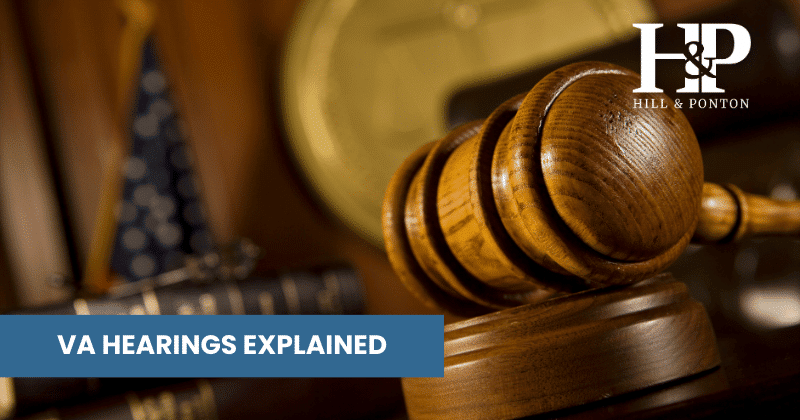One of the courtesies that the VA offers veterans and claimants for VA benefits is the opportunity to appear before a Rating Officer to “plead” his or her case and submit any additional evidence that might help the case.
These hearings occur at several stages in the claim process, including the initial claim, appeals, and BVA levels.
Why the VA Offers Hearings
The claimant’s right to a hearing is one of the VA’s responsibilities in their duty to assist.
If the claimant requests a hearing, the VA cannot deny the request in any fashion.
According to the VA’s internal manual, a hearing serves:
- to satisfy the claimant or beneficiary’s due process right to a requested hearing
- to provide a claimant or beneficiary with the opportunity to present, in person, evidence material to the issue(s) including
- his/her own testimony
- testimony of witnesses, and/or
- other evidence (exhibits)
- to provide a claimant or beneficiary (and/or his or her representative) an opportunity to present argument on the hearing issue(s)
- to emphasize the credibility of testimonial evidence through the personal presentation of testimony before the decision maker.
RO Hearings
There are two kinds of hearings that will occur when a claim is at the Regional Office (RO) level: RVSR Hearings and DRO Hearings.
These hearings are dependent on what stage the claim is currently at. RVSR Hearings When a veteran files a claim, he or she may request a hearing in connection to the claim.
Once the RO has completed its responsibilities in their duty to assist (collecting medical records, C&P exams, service records, lay statements, etc.), the RO will schedule the hearing.
This hearing will take place before a Rating Veterans Service Representative (RVSR).
This will be the same person who will issue a decision of claim after the hearing has been completed. DRO Hearings
In the event that the RVSR makes a decision that is not favorable, the claimant can file a Notice of Disagreement (NOD), which appeals this decision.
On this NOD form, the claimant has the option to request a hearing before a Decision Review Officer (DRO).
A DRO is VA rating specialist who will make a new decision on the claim.
The DRO assigned to the case will be the one who conducts the hearing.
On average, it takes about 2-3 years from the date of the NOD to obtain a hearing date.
BVA Hearings
In the event that the Decision Review Officer upholds the previous denial of the claim, he/she will issue a Statement of the Case (SOC).
This decision continues the denial of the issues on the claim, and provides an opportunity for the claimant to appeal the decision to the Board of Veterans Appeals.
In order to appeal the decision, the claimant must file a VA Form 9 within 60 days of the date on the Notice of Action (cover page of the SOC).
On the VA Form 9, the claimant can elect to have a hearing before a Veterans Law Judge (VLJ).
The claimant has three choices:
- a live videoconference hearing – held at the local RO
- an in-person hearing at Washington, D.C
- a Travel Board hearing – VLJ travels to the local RO
A live videoconference hearing is the quickest way to obtain a hearing.
Videoconference hearings are scheduled on a monthly basis. Travel Board hearings require a VLJ to travel to the local RO, and these are scheduled on a yearly basis.
That being said, it still takes 2-3 years from the date of the VA Form 9 to obtain a videoconference hearing, due to the volume of requests.
Because live videoconferences and Travel Board hearings take place at the local RO, the RO staff is responsible for scheduling all hearings, not the BVA. In fact, if the BVA receives a request for a hearing, the request is forwarded to the RO of jurisdiction for the RO staff to handle.
When a BVA videoconference hearing has been scheduled, the RO will send a hearing notice to the claimant 30 days before the hearing date.
The VLJ assigned to the claim will conduct the hearing.
Why Hearing Notices Can Be Confusing
Hearing notices can be confusing because all notices of hearing—be it at the RO level or the BVA level—come from the Regional Office.
Oftentimes, hearing notices are worded the same, with slight differences, so it is difficult to distinguish what kind of hearing has been scheduled (especially if the claimant has multiple claims pending at various levels).
The key to differentiating between hearings is often in the first few sentences of the notice.
RVSR Hearing: “The hearing you requested in connection with your claim has been scheduled for:”
DRO Hearing: “The Appeals DRO hearing you requested in connection with your claim has been scheduled for:”
BVA Hearing: “As requested, you have been scheduled to appear at a hearing before a Member of the Board of Veterans’ Appeals…”
“The Board of Veterans’ Appeals (BVA) has scheduled your hearing before a Veterans Law Judge for…”
While not all hearing notices are formulated the same, the verbiage listed above is fairly consistent throughout the VA.
Have Questions About Appealing Your Claim or Understanding How the Claims Process Works?
The attorneys at Hill & Ponton are here to support you with appealing a claim.
If you are intending to appeal a denied claim, you can contact us for an evaluation and we can help you with this process.
However, if you are considering filing an initial claim, or even if you are interested in learning about the appeals process, we offer a free ebook to get you started on the right foot!
The Road to VA Compensation Benefits will help break down the claims process from start to finish. Click the link below to learn more.





